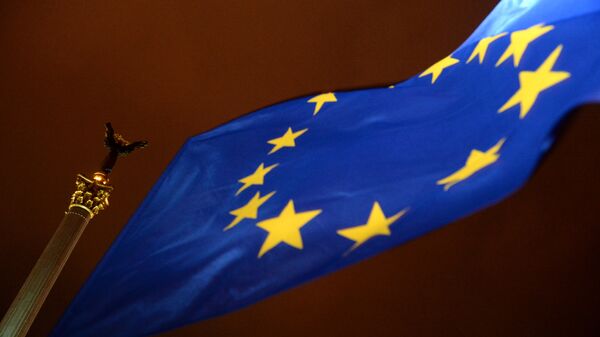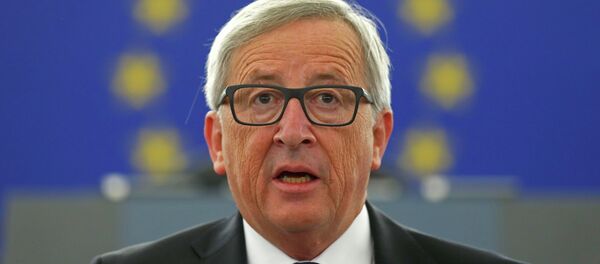Lepekhin began his op-ed, published in the 'Opinion' section of Russia's RIA Novosti news agency website, by recalling that "the concept of the boomerang effect describing the processes taking place in contemporary Europe was first used by the world's media in connection with the campaign of anti-Russian sanctions and countersanctions. Since then, the concept has also been used to explain the reasons for the mass exodus from several African and Asian countries to Europe, and the consequences of Kiev's Russophobia on Ukraine itself."
"Today," the commentator suggested, "it is once again appropriate to speak about the boomerang effect, but this time to refer to some of the consequences Europe will face from the effort, organized by Western powers, to destroy a series of sovereign states to the south and southeast of the European continent."
Far from being merely a manifestation of ordinary Europeans' dissatisfaction with the actions of EU bureaucrats, Lepekhin suggested that in fact, "the growing disintegrationist wave plaguing the bloc is a consequence of one and the same global phenomenon – the beginning of the reformatting of the modern world, in which the methods of radical mass protest come to the forefront. The results of such protests are witnessed either through referendums (in Western countries), or coup d'états and civil wars (in countries on the global periphery)."
"Today, from the United States to the smallest unrecognized republic, peoples' trust in the traditional institutions of democracy is on the decline. And this is understandable; over the last fifteen years, officials in the US State Department and those in the European Union have radically undermined public confidence not only in international law, but also in the effectiveness of institutions such as the parliamentary system and elections."
Moreover, the philosopher noted, "the vast scale of the lies told by Western politicians could not but affect the stability of the centuries-old rules and principles of contemporary politics. They lied about the events of September 11, 2001, about the dangers of weapons of mass destruction in Iraq, and Russia's 'invasion' of Georgia in 2008. They spread myths about the 'aggressive nature' of the Gaddafi regime in Libya, about Ukraine's 'revolution of dignity', about Russia being at fault for the Malaysian airliner shot down over eastern Ukraine, and about the 'bloody Assad regime' in Syria. Today, not just people outside Western countries, but those within Europe as well are increasingly looking for truths outside established Western political traditions and institutions."
In many Western countries today, Lepekhin recalled, "people no longer trust their constitutions, which are very often merely imposed (i.e. the European Constitution), or ignored by the powerful. They no longer believe in the effectiveness of electoral systems, which do not provide protection against more and more odious and irresponsible politicians from coming to power, from shaking vials of white powder before the UN, or passing out cookies and treats to neo-Nazis…It is becoming apparent that the much-vaunted Western democracy has become no less of an evil than many authoritarian regimes, and perhaps even more so."

"Unfortunately," the commentator added, "the majority, being herded by elites into a new 'electronic gulag', has no choice but to appeal to the forms and methods of direct and not necessarily strictly constitutional democracy."
"The pores of Western oligarchic political systems are clogged with corruption and formalism; social mobility has ground to a halt, and so the majority of ordinary citizens are left only with the option of entering the streets, of engaging in confrontations with the police, of signing petitions, voting on the internet, believing in the coming to power of a messiah and the power of the referendum."

"Effectively," Lepekhin suggested, on the one hand, "direct democracy becomes an 'absolute good' in situations where traditional political institutions work against the interests of the majority, or do not work at all. And so, the British voted to withdraw from the European Union not just because the ineffectiveness and other vices of EU bureaucrats have become clear as day, but also because freeing themselves of the bureaucrats was only possible by means of a national referendum." Referendums in other countries "are gaining ground in other European countries for precisely the same reason," he added.
"On the other hand, direct democracy has also always been the instrument of 'ochlos' – of mob rule. In this sense, the growing tendency among Europeans, traditionally proud of their democratic institutions, toward favoring the simplest forms of citizen participation in politics, demonstrates the bankruptcy not only of these institutions, but of the whole model of Western (oligarchic) democracy."
"History is repeating itself," Lepekhin noted. "'The lower classes do not want to live in the old way, and the upper classes cannot carry on in the old way.' Most ordinary Europeans are exhausted from the politics of deception and fraud, at the same time that Western elites cannot offer the masses an effective form of political participation."

"We are living in an information society – an environment with strong external influences working to mislead and disorient the minds of the public. Moods shift, and more and more often lead to a growing dissonance with fixed election cycles and the political institutions which they form…resulting in outbursts of activity among the masses."
At the same time, the philosopher warned, "the public has no antidote against the formation of moods beneficial to elites, who manipulate information, engage in semantic distortion, etc. As a result, the formats of direct democracy, just like those of traditional party and parliamentary systems, increasingly find themselves in the hands not of the people and of sovereign nations, but of global manipulators who, relying on the world's leading media and social networks (belonging to several transnational corporations), are capable of nimbly, promptly and invisibly implementing any desired scenario."
Returning to the situation in Ukraine, Lepekhin recalled that "many of the participants of the Kiev unrest in the winter of 2014 thought that they were fighting against a corrupt regime and for European integration. In fact, it turned out that these people, who were turned into a faceless street crowd, were used by puppeteers operating from the shadows, who would impose a pro-Western regime on the country. In the same vein, it cannot be excluded that disaffected Britons were similarly manipulated in Brexit. American and British elites could have easily received the desired referendum result, if they so desired."
Ultimately, the philosopher suggested, Brexit may very well have been a well-organized campaign concocted by American and British elites with broader goals in mind: "Unable to push Europe into the Transatlantic Partnership, their goal may have shifted to digest the continent bit by piece, first uniting the USA and the UK, and then the rest of the EU." As for the fate of the so-called European project, Lepekhin suggested that while it would be premature to speak of its destruction, there is no doubt "that the EU will soon exhaust its status as a world power and turn to the task of banal survival."




